Potbellied pigs offer unique ways to manage anxiety. You'll find comfort in their empathetic nature and calming presence. Cuddling with these gentle creatures releases oxytocin, reducing stress and promoting bonding. Establish mindful feeding rituals to create structure and focus on the present moment. Engage in playful activities like hide-and-seek with treats to redirect anxious thoughts. Build a consistent routine around your pig's care for a sense of security. Explore outdoor adventures together, boosting physical activity and mental well-being. Finally, use your pig's natural curiosity to practice sensory grounding techniques. Discover how these intelligent animals can transform your approach to anxiety management.
Emotional Support Companions
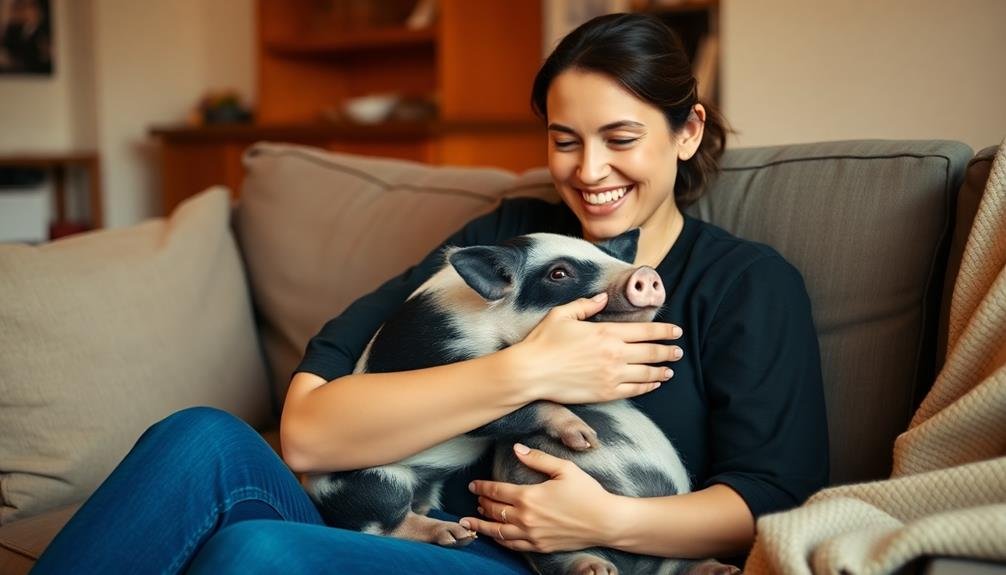
Many find solace in the companionship of potbellied pigs as emotional support animals. These intelligent and affectionate creatures can provide comfort and stability to those struggling with anxiety. When you're feeling overwhelmed, a potbellied pig's calm presence can help ground you and shift your focus away from anxious thoughts.
Potbellied pigs are highly empathetic and can sense changes in your mood. They'll often respond by offering physical comfort, such as snuggling up to you or gently nuzzling your hand. This physical contact can release oxytocin, a hormone that promotes feelings of bonding and reduces stress.
As emotional support companions, potbellied pigs require regular care and attention. This routine can give you a sense of purpose and structure, which is beneficial for managing anxiety. You'll find yourself engaging in activities like feeding, grooming, and playtime, which can serve as healthy distractions from anxious thoughts.
Unlike some traditional pets, potbellied pigs are relatively quiet and won't add to your stress with excessive noise. Their gentle nature and non-aggressive temperament make them ideal companions for those seeking a calming presence in their lives.
Stress-Reducing Cuddles
One of the most effective ways potbellied pigs provide emotional support is through physical affection. When you're feeling anxious or stressed, cuddling with your pig can offer immediate comfort and relief.
These intelligent animals are known for their affectionate nature and love of close contact with their human companions. As you wrap your arms around your potbellied pig, you'll feel their warm, soft body and steady breathing. This physical connection triggers the release of oxytocin, often called the "love hormone," which promotes feelings of bonding and reduces stress.
The rhythmic sound of their breathing can also help slow your own heart rate and induce a state of calm. Pigs are surprisingly responsive to human emotions, and they'll often sense when you're feeling down. They may nuzzle against you or rest their head in your lap, providing a soothing presence.
The act of petting your pig's smooth coat can be meditative, helping to ground you in the present moment and divert your mind from anxious thoughts. This tactile interaction can markedly lower your cortisol levels, reducing overall stress and promoting a sense of well-being.
Mindful Feeding Rituals
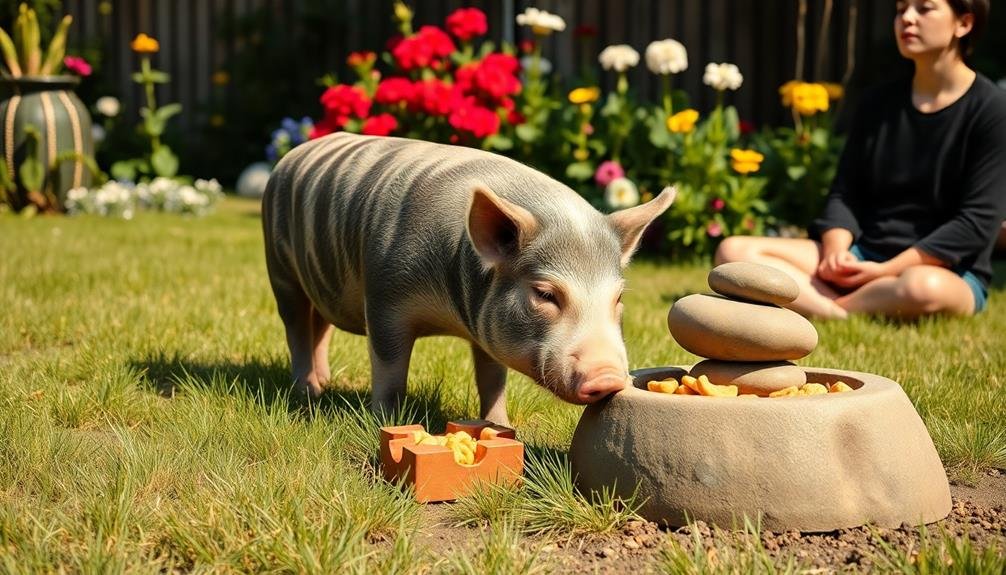
In addition to cuddling, establishing mindful feeding rituals with your potbellied pig can greatly reduce anxiety. These rituals create a structured, calming routine that helps you focus on the present moment and connect with your pet. Start by setting specific feeding times each day, allowing you to anticipate and prepare for these moments of bonding.
As you prepare your pig's meal, pay attention to the sights, sounds, and smells involved. Notice the texture of the food as you scoop it into the bowl, and listen to the gentle rustle of pellets or the soft plop of fresh vegetables.
When you present the food to your pig, observe their excitement and appreciation. This mindful approach helps ground you in the here and now, temporarily pushing anxious thoughts aside.
During feeding time, practice deep breathing exercises and focus on your pig's contentment. You'll find that this simple act of nourishing your pet can become a form of meditation, offering a respite from daily stressors.
Playful Distraction Techniques
When managing anxiety with your potbellied pig, playful distraction techniques can be incredibly effective.
You'll find that pig-inspired playtime activities, such as hide-and-seek with treats or obstacle courses, can redirect your pet's focus and reduce stress.
Additionally, engaging in snout-to-hand interactions, like gentle nose rubs or offering puzzle toys, can strengthen your bond while providing mental stimulation for your porcine companion.
Pig-Inspired Playtime Activities
Numerous pig-inspired playtime activities can serve as effective distraction techniques for managing anxiety. By engaging in these playful exercises, you'll shift your focus away from anxious thoughts and onto the present moment.
Try mimicking a pig's natural behaviors, such as rooting or wallowing, to create fun and grounding activities.
Here are some pig-inspired playtime ideas to help manage anxiety:
- "Pig in the Mud": Create a sensory bin filled with shredded paper or fabric scraps, and hide small objects inside. Use your hands or feet to "root" through the bin, finding hidden treasures.
- "Piggy Obstacle Course": Set up a simple obstacle course in your home or backyard, incorporating elements like crawling under blankets or rolling on the ground.
- "Oink and Stretch": Combine deep breathing exercises with pig-like vocalizations and gentle stretching movements.
These activities not only provide a fun distraction but also encourage physical movement and sensory engagement. You'll find yourself laughing and relaxing as you embrace your inner pig.
Engaging Snout-To-Hand Interactions
Engaging in snout-to-hand interactions with potbellied pigs can offer a unique and effective way to manage anxiety. When you place your hand near a pig's snout, you'll feel their warm breath and soft touch as they explore with their sensitive noses. This tactile experience can ground you in the present moment, shifting your focus away from anxious thoughts.
To encourage these interactions, try hiding small treats in your closed hand. As the pig gently nudges and investigates, you'll find yourself fully immersed in the activity. The pig's natural curiosity and your anticipation of their discovery create a playful, calming atmosphere.
You can also try "snout painting" by applying non-toxic, pet-safe paint to the pig's snout and letting them create art on paper with their nose movements. This creative process not only distracts from anxiety but also produces a tangible reminder of the positive experience.
Remember to approach these interactions calmly and patiently. The pig's gentle nature and rhythmic breathing can help regulate your own breathing, further reducing anxiety symptoms.
These engaging snout-to-hand activities provide a soothing, tactile focus that can greatly improve your emotional state.
Routine-Building With Pigs
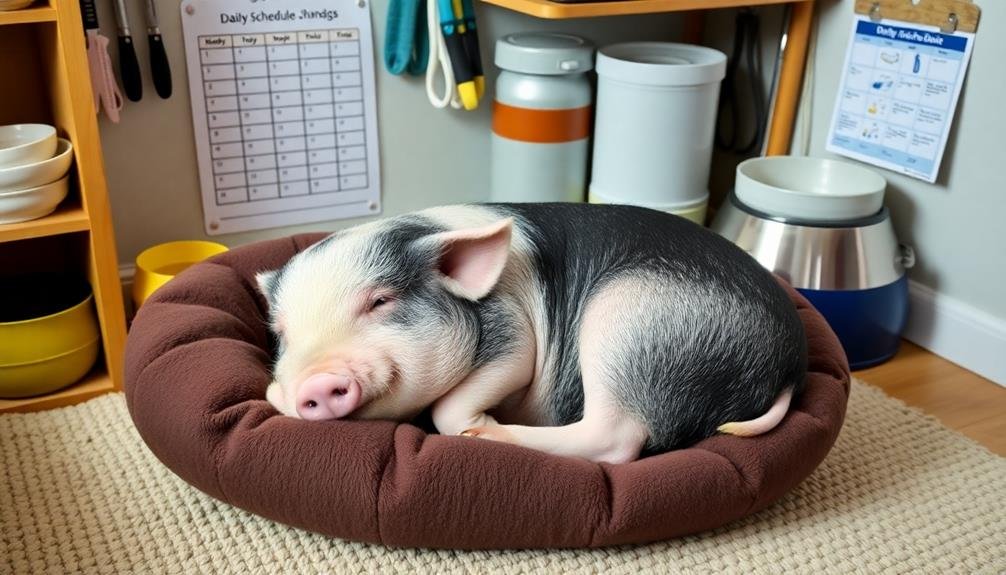
Establishing a routine for your potbellied pig can considerably reduce anxiety and create a sense of security.
You'll want to set up daily care schedules that include consistent feeding times, exercise, and social interaction.
Daily Care Schedules
A well-structured daily routine forms the backbone of a potbellied pig's sense of security and emotional well-being. When you establish a consistent daily care schedule for your pig, you're not only meeting their physical needs but also creating a predictable environment that can help reduce anxiety for both you and your pet.
Start by setting specific times for feeding, playtime, and rest. Pigs thrive on routine, so try to stick to these times as closely as possible. Include regular outdoor time for exercise and exploration, which is essential for their physical and mental health.
Don't forget to incorporate grooming and health check-ups into your schedule.
To make your daily care routine anxiety-reducing and enjoyable:
- Use positive reinforcement during care activities
- Incorporate sensory enrichment, like safe toys or foraging opportunities
- Include quiet bonding time to strengthen your relationship
Consistent Feeding Times
For potbellied pigs, consistent feeding times are the cornerstone of a stable routine. These intelligent animals thrive on predictability, and establishing regular mealtimes can greatly reduce their anxiety. You'll find that your pig's behavior becomes more settled when they know exactly when to expect their next meal.
Start by setting specific times for breakfast, dinner, and any snacks in between. Stick to these times as closely as possible, even on weekends or holidays. You'll notice your pig becoming more relaxed as they learn to anticipate their feeding schedule. This routine-building exercise doesn't just benefit your pig; it can help manage your own anxiety too.
As you commit to this feeding schedule, you'll develop a stronger bond with your pig. The act of preparing and serving meals at set times creates a shared experience that both of you can look forward to. It's an opportunity for positive interaction and reinforcement.
Outdoor Activities and Exercise
Outdoor adventures play an important role in managing anxiety for potbellied pigs. These intelligent creatures thrive on physical activity and mental stimulation, which can notably reduce stress levels.
You'll find that regular outdoor exercise not only keeps your pig physically fit but also provides vital sensory experiences that calm their nerves.
When planning outdoor activities for your potbellied pig, consider these options:
- Nature walks on a harness, allowing them to explore and forage
- Rooting in a designated area of your yard or garden
- Swimming in shallow water during warm weather
Engaging your pig in these activities stimulates their natural behaviors and instincts, promoting overall well-being.
You'll notice a decrease in anxious behaviors as they burn off excess energy and satisfy their curiosity. Remember to start slowly, gradually increasing the duration and complexity of outdoor sessions as your pig becomes more comfortable.
It's important to supervise your pig during outdoor activities and guarantee a safe environment.
Sensory Grounding Experiences
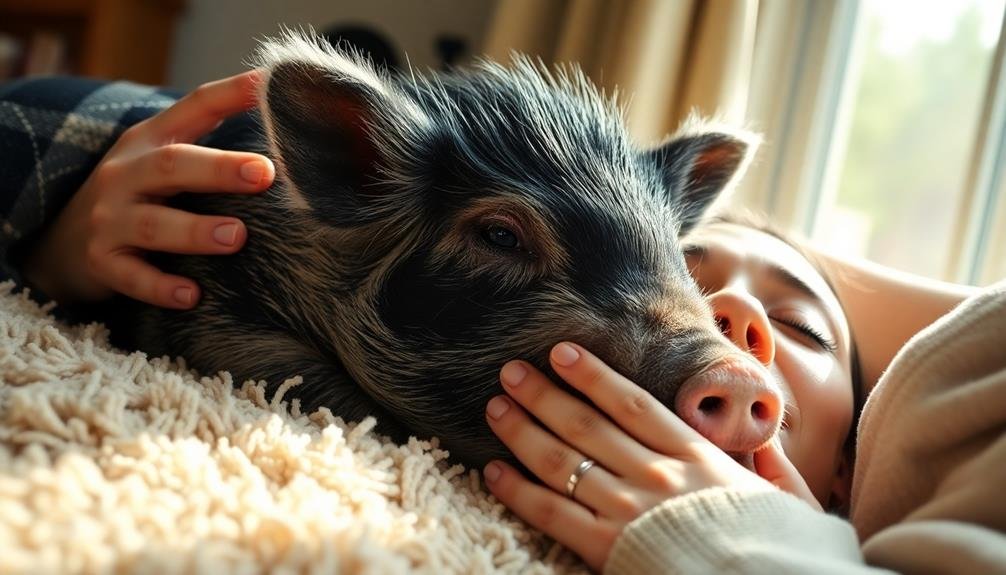
Sensory grounding experiences offer another powerful approach to managing anxiety in potbellied pigs. These techniques help your pig focus on the present moment by engaging their senses.
You can start by encouraging your pig to explore different textures in their environment. Provide a variety of surfaces like soft blankets, rough bark, or smooth stones for them to touch and investigate.
Introduce calming scents to your pig's living area. Lavender, chamomile, or vanilla can have soothing effects. You can use essential oils in a diffuser or sprinkle herbs in their bedding. Just make sure the scents aren't overwhelming.
Sound can also play an essential role in grounding. Soft, ambient music or nature sounds can help create a peaceful atmosphere. Some pigs respond well to white noise or gentle chimes.
Visual stimulation is important too. Offer your pig colorful toys or create a visually interesting environment with plants or artwork at their eye level.
Lastly, don't forget taste. Provide healthy, low-calorie treats with different flavors to engage your pig's palate. This can serve as a positive distraction and reinforce the grounding experience.
Frequently Asked Questions
Are Potbellied Pigs Legal to Keep as Pets in All Areas?
You can't assume potbellied pigs are legal everywhere as pets. Laws vary by location. Check your local zoning regulations and animal control ordinances before getting one. Some areas allow them, while others don't. Always research first.
How Long Do Potbellied Pigs Typically Live?
You'll find that potbellied pigs typically live 12-18 years, but they can reach up to 20 years with proper care. They're long-lived companions, so be prepared for a significant commitment when adopting one as a pet.
What Are the Potential Health Concerns for Potbellied Pig Owners?
You'll need to watch out for obesity, joint issues, and respiratory problems in your potbellied pig. They're prone to dental issues and skin conditions too. Regular vet check-ups are essential to catch and treat potential health concerns early.
Can Potbellied Pigs Be Trained Like Dogs?
Yes, you can train potbellied pigs like dogs. They're intelligent and can learn commands, tricks, and even use litter boxes. You'll need patience and positive reinforcement techniques. Remember, they're not exactly like dogs, but they're highly trainable.
What Special Dietary Requirements Do Potbellied Pigs Have?
You'll need to provide your potbellied pig a balanced diet low in fat and high in fiber. They can't digest animal proteins well, so stick to vegetables, fruits, and commercial pig feed. Avoid overfeeding to prevent obesity.
In Summary
You've discovered the unique ways potbellied pigs can help manage your anxiety. From emotional support to mindful feeding rituals, these intelligent animals offer a range of calming benefits. By incorporating a pig into your routine, you're embracing a natural, holistic approach to anxiety management. Whether it's cuddles, outdoor activities, or sensory experiences, your potbellied companion can be a valuable ally in your mental health journey. Give it a try—you might be surprised by the results!



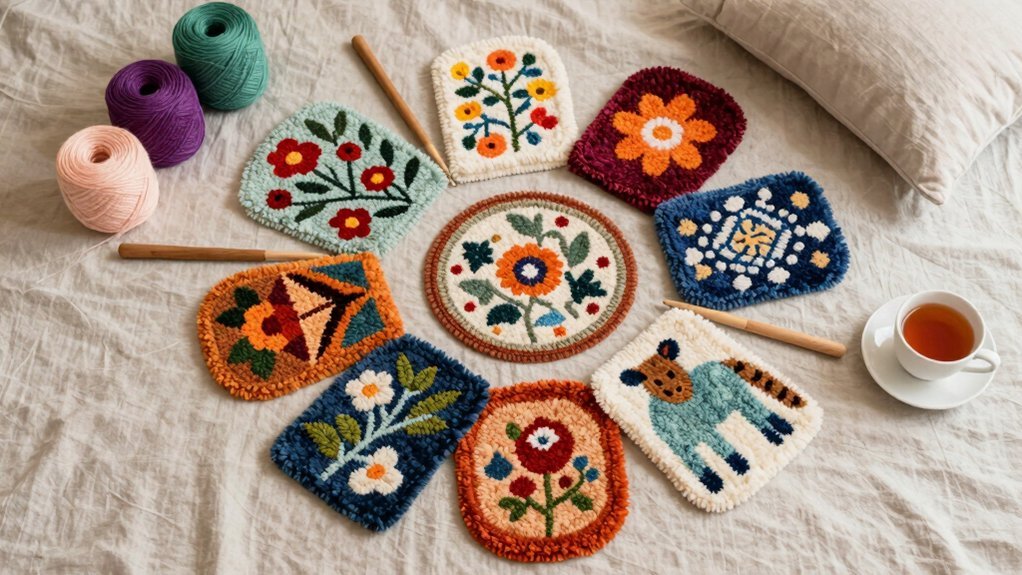

Leave a Reply